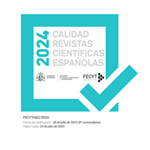Todavía sobre la objetividad periodística: hacia la superación de un paradigma fracturado
Resumen
Desde finales del siglo XIX, la teoría de la objetividad fue generando el que llegaría a ser el paradigma dominante en el ejercicio periodístico, así como en la reflexión académica sobre él. Sin embargo, durante las últimas décadas del siglo XX, fue surgiendo un creciente número de académicos y periodistas que rebatieron las tesis fundamentales de este paradigma, hasta llegar a ponerlo en crisis. Desde entonces, ningún otro concepto ha suscitado tanta controversia como el concepto de objetividad, que todavía origina debates, no sólo interminables, sino inconcluyentes. En este artículo se aborda la cuestión desde una perspectiva habitualmente ignorada: la de los fundamentos filosóficos de la teoría objetivista y su relación con el positivismo, cuyas raíces se remontan al empirismo inglés. Analizando tales fundamentos, se argumenta que la teoría objetivista parte de una pregunta mal concebida, lo cual explica por qué estamos ante un paradigma fracturado, que, pese a ello, sigue todavía firmemente arraigado en nuestras mentes. Finalmente, se apuntan algunas vías hacia su posible superación.Descargas
Descarga artículo
Licencia
La revista Estudios sobre el Mensaje Periodístico, para fomentar el intercambio global del conocimiento, facilita el acceso sin restricciones a sus contenidos desde el momento de su publicación en la presente edición electrónica, y por eso es una revista de acceso abierto. Los originales publicados en esta revista son propiedad de la Universidad Complutense de Madrid y es obligatorio citar su procedencia en cualquier reproducción total o parcial. Todos los contenidos se distribuyen bajo una licencia de uso y distribución Creative Commons Reconocimiento 4.0 (CC BY 4.0). Esta circunstancia ha de hacerse constar expresamente de esta forma cuando sea necesario. Puede consultar la versión informativa y el texto legal de la licencia.










